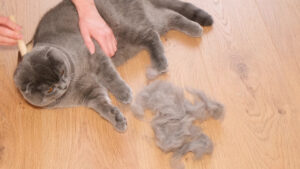
Even though it might not be as romantic as Valentine’s Day, Hairball Awareness Day reminds cat owners to learn more about hairballs, or furballs, and analyze their cats’ health.
Even though it might not be as romantic as Valentine’s Day, Hairball Awareness Day reminds cat owners to learn more about hairballs, or furballs, and analyze their cats’ health. This is something essential that every pet parent should be aware of so that they can take the necessary steps and manage the issue in the best way possible. Fortunately, Mount Carmel Animal Hospital, based near Southern York County, PA, can help!
What is a Cat Hairball?
Cat hairballs are a typical product of the cat grooming process. It’s a collection of digestive juices and dead hair developed in your cat’s stomach. This happens by cats grooming themselves and swallowing the hairs, building into hairballs in their tummies. Medium and long-haired cats are especially prone, but any cat can develop hairballs.
Why Is It an Issue?
Most individual hairs will usually pass through your cat’s digestive system, but sometimes, they can develop clumps, which may accumulate in the stomach. Cats attempt to vomit them up to prevent the hairs from entering the intestine, which can lead to a blockage.
Signs/Symptoms
When a feline attempts to bring up a hairball, it might start to retch, gag, or act like they are dry heaving and then vomit. Sometimes, the sound cats make is known as a “cough-gag-retch.” This is because your pet can appear to be coughing from the lungs, gagging through their throat, and retching from the stomach. Take your cat to a vet if he or she experiences any of the following cat hairball symptoms:
- Lethargy
- Constipation or diarrhea
- Reduced appetite
- Prolonged vomiting, gagging, and retching without producing a hairball
- Excessive grass nibbling
- A swollen or sensitive stomach
Diagnosis
There are many ways in which a veterinarian might diagnose cat hairballs. This will involve a physical examination and possibly an x-ray. In extreme cases, surgery might be necessary to eliminate the hairball if it has become immense, leading to expensive vet bills. It’s normal for a feline to bring occasional hairballs, but constant retching and lethargy suggest that the issue is larger and requires attention.
Treatment
When your cat has hairballs, it’s normal to wonder what treatments are available. Although several home remedies are online, particularly for oils and lubricants, avoiding these is advisable. One particularly effective treatment to treat hairballs is cat food specifically formulated to help with hairballs. These kibble-based products have lots of fiber to help eliminate excess fur through the cat’s digestive system. They also contain minerals and vitamins to keep your cat’s coat in good condition and minimize hair loss. There are also veterinary-formulated lubricants in the form of a tasty paste like Laxatone that help pass the fur along the GI tract. At Mount Carmel Animal Hospital, our staff can prescribe hairball treatments in severe scenarios.
Prevention of Hairballs in Cats
There is no method to stop hairballs from developing entirely, but there are various things cat owners can do to help:
Brush Your Feline
Proper cat grooming can assist in eliminating dead and loose hair on their coat. This signifies there is less loose hair for your cat to swallow when he or she grooms themselves in private. In honor of Hairball Awareness Day, talk to us if your cat continues to have hairball problems.
Schedule Regular Haircuts
Regularly trimming your medium or long-haired cat helps to ensure that the hair your feline consumes is less likely to become tangled into a hairball. In honor of Hairball Awareness Day on April 26, take your cat to one of our professional pet groomers!
Provide Hairball-Specific Food to Your Cat
Feeding your feline the right balance of nutrients is essential in addressing hairball problems. There are plenty of commercial options available. Be sure to talk to one of our vets to help you decide which one best fits your cat’s needs.
HERE AT MOUNT CARMEL ANIMAL HOSPITAL, WE’LL TREAT YOUR PETS LIKE FAMILY!
Mount Carmel Animal Hospital has been serving the Northern Baltimore/Southern York community for over 30 years and is proud to be an independently operated, small animal practice committed to excellence in veterinary medicine and client service. From grooming to wellness services, along with Canine Life Skills Training Courses, and surgical procedures, we have the expertise that will best serve the needs of you and your pet. Contact us at 410-343-0200 and follow us on Facebook
